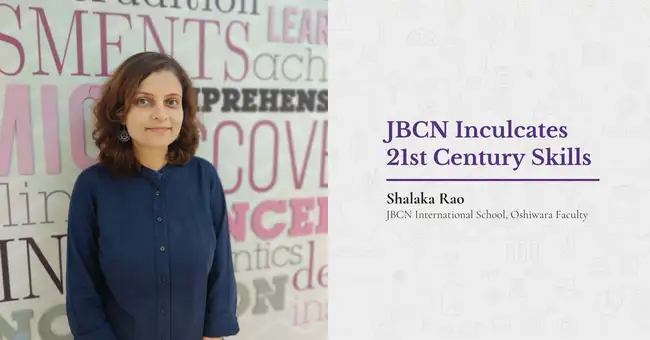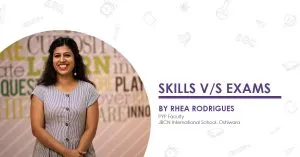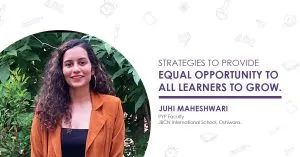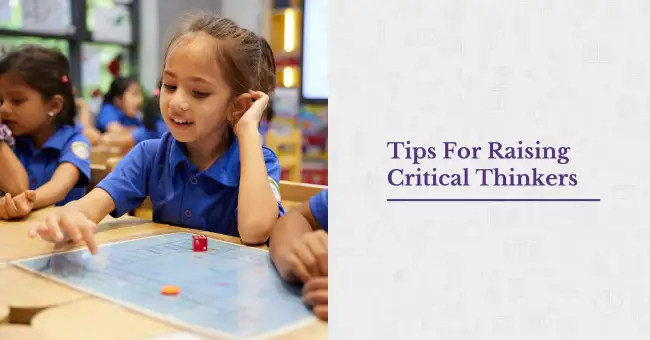
Tips On How To Improve Memory And Concentration In Your Child
As parents, it is worrying to see our children unable to pay steady attention to studies and getting distracted easily. This is the case for children as well as adults all over the world as we’re living in an increasingly dynamic world - with technology and advertisements evolving every day and luring us with new creations.Thankfully, the brain is a powerful organ that makes new neural connections every time you learn a new skill, develop a new habit, or memorise something. This means that with enough practice and consistency, we can actually train our brain and enhance its abilities- including concentration and memory.
Here are a few useful tips which you can share with your children to help them their improve memory and concentration:
Eating:
It’s a no-brainer that in order to improve the brain’s functions, we have to give it the right kind of nutrition. Our diet must include plenty of fruits and green leafy vegetables as they are high in vitamins, antioxidants and phytonutrients which fuels the brain.We should avoid white sugar, artificial sugars, saturated fats, and refined carbs but maintain a regular supply of omega 3 fatty acids and vitamins (B12 and D) from fish or other supplements. Introducing healthy fat foods such as nuts, avocados in the diet and using coconut oil to cook instead of canola oil or soy oil can be very beneficial.
Turmeric and rosemary are good for the brain too. Indulge in chocolates once in a while as they contain flavonoids, theobromine and caffeine that is said to improve memory and concentration. Drinking a glass of milk also boosts brain power. This is one of the best tips on How To Improve Memory And Concentration.
Reading:
Reading without questioning, reasoning, and categorizing means relying heavily on ‘remembering’ rather than ‘understanding’ - a strategy that always lets down students when they need it the most. Instead we should encourage our children to be active readers and learners: to ask questions before, during, and after the reading session; to understand what is happening and why; to go the extra mile and read other books or watch documentaries on sections that interest them; and to periodically review and summarise what they’ve just read.An effective method is the PQRST Method:
Preview – This involves skimming through the chapter to understand the content outline and basics.
Question - ask questions that may occur while skim reading or view the questions at the end of the chapter.
Read - read the chapter intently without trying to memorise or take any notes and find the answers to the questions.
State - state the answers of the key questions in the chapter out loud.
Test - re-read and test yourself at regular intervals throughout the day to see how much information is retained.
This is one of the best tips on How To Improve Memory And Concentration.
Studying:
There are a number of effective ways and tools to facilitate easier learning-(i) Visualisation
Visualising what you’re trying to remember helps a lot. For instance, while studying about a war, imagine you’re a soldier in the army and experiencing what is written in the text; while studying about the topography of a region, imagine you live there with your family and do agriculture; while studying about the human body, imagine you’re a doctor; and so on.The visualisation also works when trying to remember small information like names or numbers. Let’s say you want to remember that a person’s name is Nikhil. So, imagine him sitting on a lovely hill holding a sign that says ‘Nik’! To remember a few digits of a number, imagine it lit up in broadway lights. With the visualisation technique, the more creative you get, the more easily you will remember information! This is one of the best tips on How To Improve Memory And Concentration.
(ii) Recalling the environment
In order to retrieve a memory, sometimes it is helpful to use your other sense cues. For remembering the name of the food, you could try remembering the taste of the food, where you were eating it, what you were wearing, and so on. For children writing an exam, remembering where they studied a particular text can help them recall the information easily.(iii) Association
Remembering lists or points of chapters and subjects is a big part of giving exams. Teach your children how to make mind maps or memory palaces to remember lists perfectly. Mind maps are colourful diagrams used to organise information in your mind. Memory palaces, however, require a bit more work. The trick is to help your children create memory palaces in places they know in and out - like your home.Ask your children to pick 5 big items in a clockwise manner from each room in the house and assign them numbers 1-5,6-10,11-15 and so on. Help your child thoroughly remember what number is assigned to each furniture item. Then, while remembering lists, your child has to assign each point on the list to the corresponding furniture item. So, let’s say point 8 is sheep and the furniture with number 8 assigned is a TV. So, the child can imagine the sheep playing around the TV or sitting on the TV. This is one of the best tips on How To Improve Memory And Concentration.
(iv) Teaching
 This is a great technique to concretely understand information as it allows children to explain concepts using their own words as well as reply to questions asked of them. Sometimes, parents can become learners so that the child can teach a concept.
This is a great technique to concretely understand information as it allows children to explain concepts using their own words as well as reply to questions asked of them. Sometimes, parents can become learners so that the child can teach a concept.(v) Group studying
Group studying helps children divide the studies and take the role of a teacher from time to time thus improving their speaking and listening skills. Studying with friends in an informal environment makes learning more fun and interactive. It also helps them to remember information more vividly as they can recall the environment and remember which friend taught what concept. This is one of the best tips on How To Improve Memory And Concentration.(vi) Regular breaks
Students may procrastinate studying because the prospect of studying for long hours scares them and they think that they cannot take big breaks in between. Studying at a stretch saturates the mind and impairs focus and concentration. Short breaks allow the mind to absorb the information and also refreshes it for more learning. That is why children must take appropriate breaks while studying: 10 mins break for every 25 mins of studying or 15 mins break for every 45 mins of studying.(vii) Goals and rewards
Children should set up a ‘goals and rewards system’ to motivate themselves. It could be something like- ‘If I am able to complete this chapter in the next 2 hours, then I can watch an episode on TV.’ This system acts an incentive and helps the children achieve their study goals faster. This is one of the best tips on How To Improve Memory And Concentration.(viii) Changing study places
A change in surroundings always makes the mind more alert - an invaluable trait from our ‘fight or flight’ response mechanism. Sitting in one place for too long makes the body and mind comfortable and can result in lack of attentiveness. Children should be asked to switch study places from time to time to make the brain more alert and increase retention.(ix) Drawing diagrams
Categorising information in a visual form improves the mind’s ability to remember. Encourage your child to draw diagrams, tables or anything that could help them remember information in a fun way. This is a more tangible form of visualisation and the mind maps and works well as the children can refer to it again and again to imprint the information well in their minds.(x) Use of mnemonics
Mnemonics makes remembering easier. We have already discussed 2 types of mnemonics - visualisation and memory palace, but there are a few more. Acrostics (making a sentence of an abbreviation: Every Good Boy Deserves Fudge helps to remember the treble clef notes E G B D F); Acronyms (making abbreviations: NATO for North Atlantic Treaty Organisation); Rhymes and Alliterations; and Chunking (breaking big sentences / numbers into smaller chunks) are some of the mnemonics that can aid learning. Remember to make the mnemonics mean something related to the study concept in order to avoid getting mixed up.(xi) Speaking loudly
 You’re 50% more likely to remember something if you say it out loud than if you just read it over and over again in your mind. Encourage your children to read their textbook out loud whenever they can, especially for the harder subjects. Reading aloud helps them with pronunciation and spelling of the words too, thereby making it more effective. This is one of the best tips on How To Improve Memory And Concentration.
You’re 50% more likely to remember something if you say it out loud than if you just read it over and over again in your mind. Encourage your children to read their textbook out loud whenever they can, especially for the harder subjects. Reading aloud helps them with pronunciation and spelling of the words too, thereby making it more effective. This is one of the best tips on How To Improve Memory And Concentration.(xii) Exercise and Yoga
Performing cardiovascular or aerobic exercises/yoga on a regular basis improves cognitive function and enhances memory. They enlarge the hippocampus (the most vital part of the brain for memory) and increase the secretion of a brain-derived neurotrophic factor - a protein necessary for long-term memory. They also cause new connections to sprout between the neurons in the hippocampus. A quick walk or run 20 mins before studying is also said to improve focus and concentration.(xiii) Removing distractions
Switching off electronic devices or keeping them out of comfortable reach are some ways towards removing distractions. Encourage your children to put their personal cell phones to flight mode while studying. This is one of the best tips on How To Improve Memory And Concentration.(xiv) Not studying on an empty stomach
Glucose improves memory and that is why memory formation is better after a meal. However, be careful not to eat a heavy portion as digestion robs energy from the brain.(xv) Studying before sleeping
Study or revise material just before going to bed. As the brain does not have to process any new experiences, the information is remembered better the next day. This is one of the best tips on How To Improve Memory And Concentration.(xvi) Listening to the right tunes
Listening to classical music pieces such as those of Beethoven and Mozart are said to improve focus and concentration. However, other music, TV, radio, video games, etc. should not be kept playing in the background when studying.Secrets Hacks On How To Improve Memory And Concentration:
(i) Sleep
 Sleeping regularly for 7-8 hours improves memory, concentration, and motivation. The brain processes all the information learned during the day at night, when you sleep. It converts important memories into long-term memories thus helping you remember all that information the next day. Teach your children to study and revise beforehand so they don’t have to compromise on their sleep before exam day.
Sleeping regularly for 7-8 hours improves memory, concentration, and motivation. The brain processes all the information learned during the day at night, when you sleep. It converts important memories into long-term memories thus helping you remember all that information the next day. Teach your children to study and revise beforehand so they don’t have to compromise on their sleep before exam day.
(ii) Drink water
Water helps transmit nutrients to the brain, stimulating it to improve focus. Drink plenty of water as even mild dehydration causes shrinking of the brain tissue and temporary loss of cognition, concentration, and memory.(iii) Mental snapshots
To remember something vividly, concentrate on it for at least 8 seconds and take a mental snapshot of it. This is one of the best tips on How To Improve Memory And Concentration.(iv) Use good fonts
When typing notes, use fonts that are easy to read like Times New Roman and Arial.(v) Clench your fist
Clenching your fist can significantly improve your ability to recall information. Clench the fist of your dominant hand for about 45 seconds when trying to memorise information. When you want to retrieve the information, clench the fist of your other hand. Researchers believe that the movements activate brain regions key to the storing and recalling of memories.(vi) Perform brain workouts
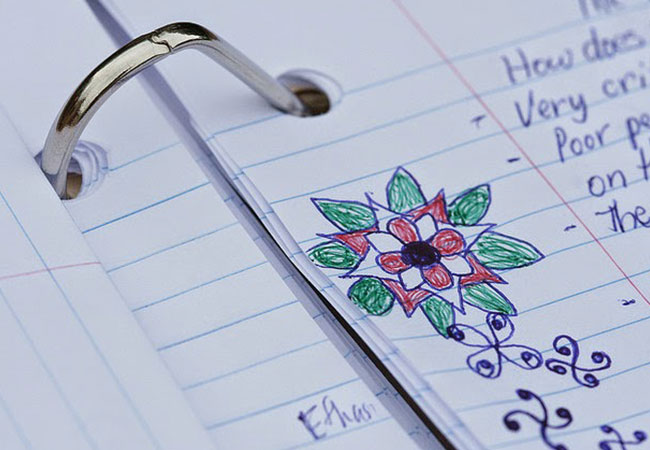 When it comes to the brain, you either use it or lose it. Stimulate the brain by learning new things and having new experiences. Children can pick up new hobbies, play sudoku and crossword, learn new skills, and perform other stimulating exercises to be on top of their brain game. This is one of the best tips on How To Improve Memory And Concentration.
When it comes to the brain, you either use it or lose it. Stimulate the brain by learning new things and having new experiences. Children can pick up new hobbies, play sudoku and crossword, learn new skills, and perform other stimulating exercises to be on top of their brain game. This is one of the best tips on How To Improve Memory And Concentration.(vii) Doodle
Doodling exercises the brain, thus helping to concentrate, grasp new information, and retain information.(viii) Have gum or peppermint
It is believed that chewing gum increases the flow of oxygen to the brain, thus enhancing the ability to concentrate. In addition, having peppermint gum, mint, or tea is also highly effective in improving concentration, memory and attention span.(ix) Practice listening
When having a conversation, encourage your child to listen carefully. This improves their attention span. This is one of the best tips on How To Improve Memory And Concentration.(x) Colours
Looking at the colour blue is said to increase creativity whereas looking at the colour red is said to improve focus and memory. Even having a green light improves concentration.(xi) Wiggle your eyes
Seemingly, wiggling the eyes from left to right for 30 seconds is said to improve focus and boost concentration. Scientists believe that this movement improves communication between the left and right sides of the brain, thus bolstering mental performance.(xii) Admire nature
Walking in a park, looking at trees out of the window or simply staring at pictures of nature is said to improve memory as it calms the mind and helps you steady your thoughts. This is one of the best tips on How To Improve Memory And Concentration.We hope you liked our comprehensive list on how to improve memory and concentration in your children. Which ones work best for you? Let us know in the comments section below.

